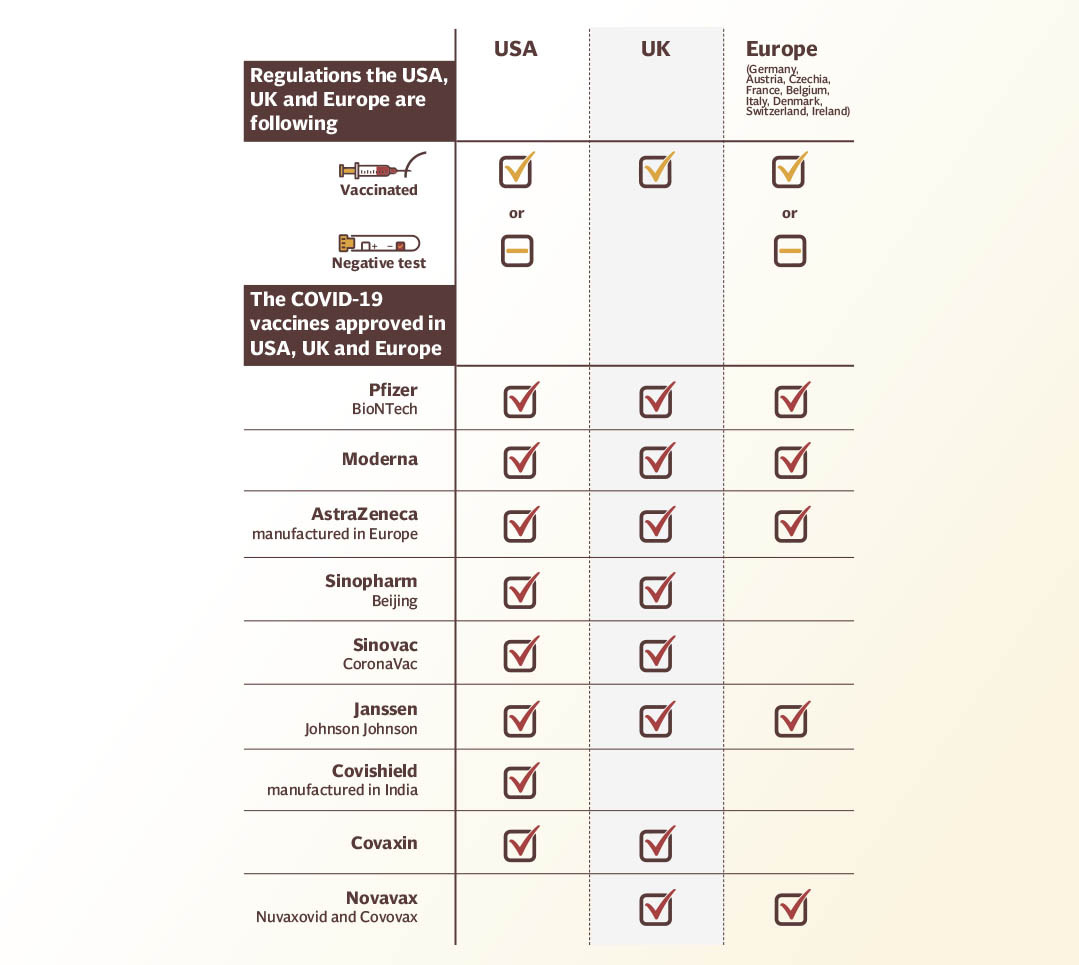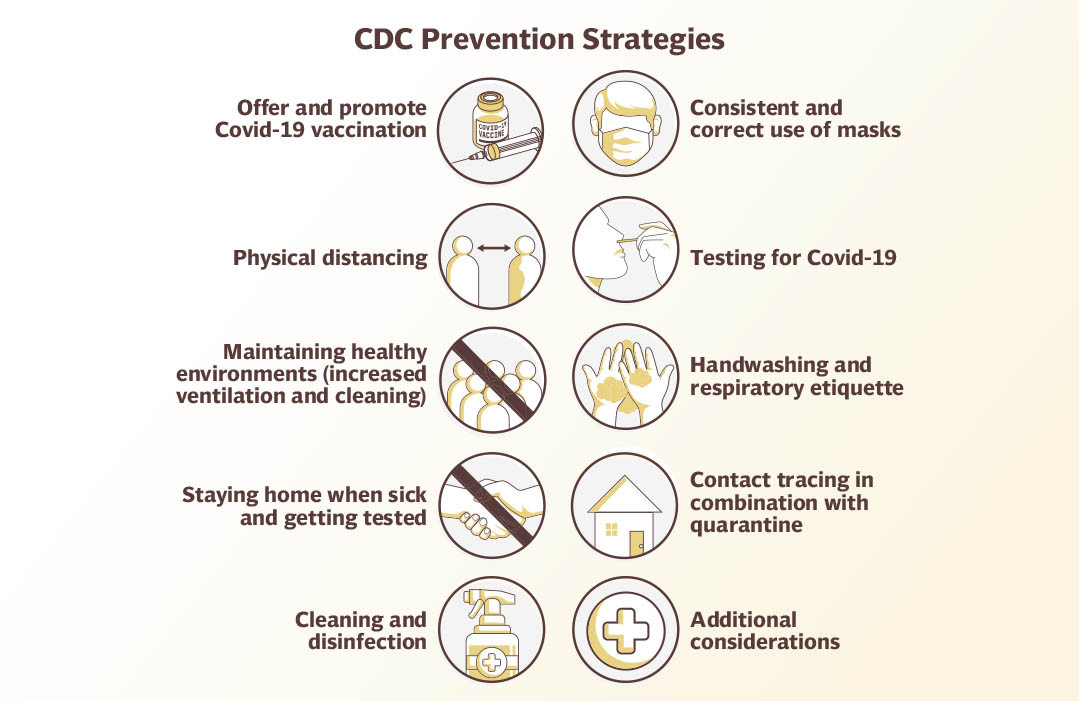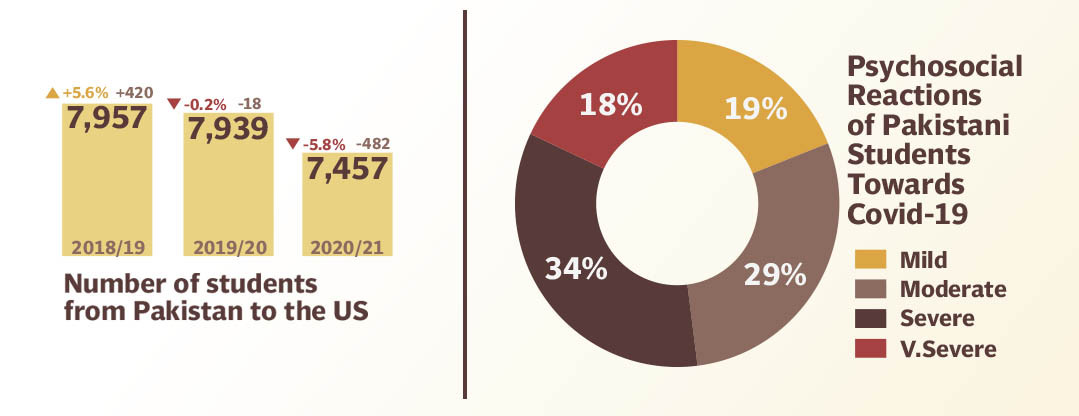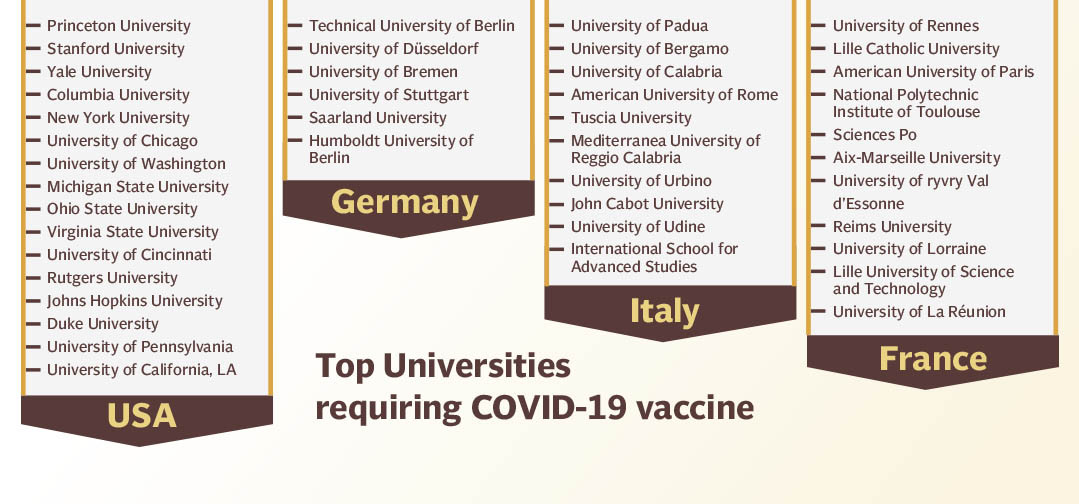Studying abroad, evading the virus
Moving to a different country for school has never been easy. Vaccination and testing have made it even harder
KARACHI:The onset of the pandemic in 2020 turned the world upside down. Two years later, students trying to learn about the world by studying abroad are still facing roadblocks. The COVID-19 era requires students to navigate a labyrinth of vaccine and testing requirements that differ between universities. Those who are already studying abroad must stay up to date with what’s required of them, while students hoping to depart for the new semester now must make decisions based not only on their interests but also their vaccination status.
When the pandemic hit, many universities around the world closed for in-person classes and shifted to online set-ups. The return of in-person lectures has brought a range of country and university-specific vaccination regulations that students need to follow. Some universities have restricted students from entering campus if they’re not vaccinated. Meanwhile, universities have started removing the online option for classes, putting some students who aren’t vaccinated or who’ve gotten a vaccine their university doesn’t accept in a bind.
According to the Centers for Disease Control and Prevention (CDC) guidelines, people are considered fully vaccinated 14-days after receiving a one-dose COVID-19 vaccine, or 14-days after the second dose of a two-dose COVID-19 vaccine. Alma Miftari, a public relations executive at Erudera.com, an education search platform, told The Express Tribute that the same applies to students. She said for universities in the United States, if the vaccine is administered outside of the US, it must be approved by the World Health Association. Students must have completed a full series of a vaccine, according to the guidelines of the manufacturer. Students must also receive a booster vaccine within 30 days of qualifying for one.
To qualify for a booster vaccine, students must be at least 18 years old. And they must have gotten the booster at least five months after the second dose of the Pfizer or Moderna vaccine, or at least two months after the Johnson & Johnson vaccine. Although there are fewer regulations for students this year than last, which should ideally make it easier for students to travel, the number of students from Pakistan going to the US to study has changed only slightly.
According to official government data, 7,957 Pakistani students studied abroad in the US in 2019 and 7,939 in 2020. In the two years since the pandemic started, the number has been closer to 7,457 -- which is 5.8 percent lower than pre-COVID. The number of students studying abroad in 2019 was higher than in 2018. But since the pandemic started, there's been a downward trend.
Vaccine required

COVID-19 restrictions differ between countries, which is an added challenge for students trying to decide where to study. Miftari said the US requires students to be fully vaccinated when they come for their studies or to show a negative test result when they reach the country. In the United Kingdom, PCR tests are not sufficient, and all students must be fully vaccinated. Other European countries, including Germany, Austria, the Czech Republic, France, Belgium, Italy, Denmark, Switzerland, and Ireland accept negative PCR test results but highly encourage students to get fully vaccinated.
Different countries also have different criteria for officially accepted vaccines. Some countries don’t accept Chinese vaccines, for example. According to VisaGuide.world, a worldwide guide for visa information, vaccines valid for the US are Pfizer BioNTech, Moderna, AstraZeneca (manufactured in Europe), Sinopharm Beijing, Sinovac, Janssen (Johnson & Johnson), Covishield (Astra Zeneca manufactured in India) and Covaxim. Valid vaccines in the UK are Covaxin, Moderna, Janssen (Johnson & Johnson), Novavax (Nuvaxovid and Covovax), Oxford/AstraZeneca, Pfizer BioNTech, Sinopharm Beijing, and Sinovac-CoronaVac. Vaccines recognized in Europe by the European Medicines Agency (EMA) are Nuvaxovid, Pfizer/BioNTech, Moderna, AstraZeneca, and Johnson & Johnson.
Students who were already aboard when the pandemic started have not been spared the COVID-19 headaches. “They were the ones who went under a lot of pressure and stress — from obstacles returning to their home countries to the inability to pay off debt, tuition, rent, and other educational expenses as a result of job losses and financial difficulties,” Miftari said. She said these problems were intensified for students trying to deal with these obstacles away from their home countries, families, and communities.
If these obstacles weren’t significant enough on their own, students also had to figure out how to transition from traditional on-campus classes to online education without falling behind in their studies. While some students learned to adapt quickly, others had issues grasping information and focusing when classes shifted online. Two years into the pandemic, Miftari said students are still struggling to succeed and sustain themselves abroad. “A large percentage of international students agreed that the pandemic has been a major obstacle for them in pursuing higher education abroad,” she said.
Barriers to travel

Many students who were planning to study abroad this year had to delay their travel until next year due to slow visa processing times because of closed embassies, online classes, financial issues, and travel restrictions. “It was a difficult situation for students who were already enrolled in courses abroad and were in their final year of studies with no certainty about when the courses would end and whether they would be able to find employment after graduation,” Miftari said.
She talks with students about their options to help quell some of their fears. But for many, there are lingering concerns about how to move forward. “International students today face fewer problems than they did at the beginning of the pandemic. But they are still unable to get the full experience of student life,” she said. “Many things have changed, but it has also been a challenge for all stakeholders to ensure that students get the education they deserve,” she said.
Challenges wrought by the pandemic have made things complicated for students. Zubair Ashraf went to Germany for his master’s degree six months ago after getting the Sinovac vaccine in Pakistan. He knew Germany wasn’t accepting Sinovac but it was his only option at the time, so he went ahead and got it. “My university accepted my two doses [of] vaccine and made me a university vaccine pass which was valid to take classes, “Ashraf said. But when the Omicron variant started to be more widespread, his university changed the rules for vaccines and made booster shots mandatory for everyone.
When he tried to get the booster shot, health authorities in Germany didn’t accept his vaccination and asked him to get vaccinated again. He was given options of either the Moderna or BioNTech vaccine. After the first round of vaccines, he had to wait three weeks for the second shot and three more months for the booster. During that time, he wasn’t able to enter many indoor places per the country’s regulations. “I cannot go to any eatery or even coffee house,” he said. He was allowed on campus but couldn’t visit other places in the city before he completed his booster shot.
With the uncertainty and financial issues students were facing, many have returned to their home countries because they lost jobs or were unable to pay their fees and rent. Fatima [surname + age]. a Pakistani student studying public relations in the US, said her parents sold their car and borrowed money from friends and family to pay for her previous college semesters.
But she said amid the global economic collapse with the devaluation of the Pakistan rupee, her family will not be able to afford the $22,000 tuition for her last semester of college. "Right now, we definitely can't pay for the last semester, and there are only four courses left," she said. She worries she will have to return to Pakistan if her family can’t scrape together the money to pay tuition before the semester starts. "My world is falling apart."
Fardeen Saleem, 22, an agriculture and business management undergraduate at The University of Karachi, got selected for an exchange semester in New York, but due to travel restrictions during the first year of the pandemic had to defer. Now that she is in her final year of university she is no longer eligible for the exchange program. “I got selected and even went to get my passport renewed,” she said. A week later, the first case of COVID-19 was reported in Pakistan and Saleem had to cancel her plans. “All my efforts were in vain,” she said.

Despite new obstacles for studying abroad during the pandemic, there are still some students who’ve managed to do it. Brashna Kasi won a Fulbright scholarship to study in the United States in 2021. When she applied, vaccinations were fairly new and she wasn’t sure if she’d be able to get one from Pakistan that the US university would accept. “Only Sinovac and Sinopharm [were] available,” Kasi said, talking about the Chinese vaccines that were administered in Pakistan early on.
Initially, her classes were online, and she only had to have a negative PCR test to come to the campus. But now, the university has made vaccination and booster shots mandatory for all students. The only students exempt are those with medical conditions and anyone who has not gotten the booster because their first vaccine was less than six months ago.
She said her biggest frustration is the discrepancy between country rules and university rules. “We do not need any test or vaccination certificate for even domestic travel,” she said. “All the classes are now on-campus then the rules of the university have to be followed and they only allow vaccinated students.”
Due to these rules and regulations, some students have had to submit extra documents to be able to study. “I had to share my quarantine bookings with them before booking the flight,” Asim Siddique, a doctoral fellow in Malaysia said. He said his course work for his Ph.D. was done online, and he is now trying to travel to Malaysia for research purposes.
University rules

In the US, over 1,000 higher education institutions require students, including international students from Pakistan, to be vaccinated against COVID-19. The US is one of the most popular destinations for studying abroad, attracting more than one million international students every year from around the world. For the 2019/20 academic year, there were a total of 8,894 Pakistanis studying and working in the US (7,939 students and 955 scholars).
The latest statistics show that by the academic year 2020/2021 there were 7,475 students from Pakistan enrolled in American colleges. Between the academic year 2019/20 and 2020/21, the number of students from Pakistan in the US dropped by 6 percent. Higher education experts believe that one of the main reasons for this decline is the implementation of vaccines regulations by American Universities.
Some of the top US Universities requiring COVID-19 vaccine:
· Princeton University
· Stanford University
· Yale University
· Columbia University
· New York University
· University of Chicago
· University of Washington
· Michigan State University
· Ohio State University
· Virginia State University
· University of Cincinnati
· Rutgers University
· Johns Hopkins University
· Duke University
· University of Pennsylvania
· University of California, LA
Other universities such as Arizona State University, University of South Carolina, Ohio State University, Indiana State University require students to wear masks during attendance in addition to being vaccinated. At Harvard University, 97 percent of employees and 96 percent of students are already vaccinated for Covid-19.
Yale University reports vaccination rates as follows:
· 99.5% of undergraduate students
· 98.2% of graduate & professional students
· 96.5% of faculty
· 92.7% of staff
At the University of Pennsylvania, 97 percent of faculty and staff, 96 percent of the student population, and 99 percent of undergraduate students are vaccinated against COVID-19. European educational institutions in countries such as Germany, Austria, Czechia, Denmark, France, Italy have similarly high vaccination rates because vaccination certificates or negative tests for the disease are required for students.
In Germany, among other, the following institutions:
· Technical University of Berlin
· University of Düsseldorf
· University of Bremen
· University of Stuttgart
· Saarland University
· Humboldt University of Berlin
In France
· University of Rennes
· Lille Catholic University
· American University of Paris
· National Polytechnic Institute of Toulouse
· Sciences Po
· Aix-Marseille University
· University of ryvry Val d'Essonne
· Reims University
· University of Lorraine
· Lille University of Science and Technology
· University of La Réunion
In Italy
· University of Padua
· University of Bergamo
· University of Calabria
· American University of Rome
· Tuscia University
· Mediterranea University of Reggio Calabria
· University of Urbino
· John Cabot University
· University of Udine
· International School for Advanced Studies
Even though more international universities and colleges are not allowing unvaccinated students to return to campuses, some students, staff, and faculty can apply for exemptions for medical and religious reasons.
According to Our World in Data, a scientific publication compiling data on major global issues, 47.6 percent of the world’s population has received at least one COVID-19 vaccine dose. Only 2.5 percent of the population in low-income countries have received at least one dose of a vaccine. A total of 6.54 billion doses have been administered worldwide.


COMMENTS
Comments are moderated and generally will be posted if they are on-topic and not abusive.
For more information, please see our Comments FAQ